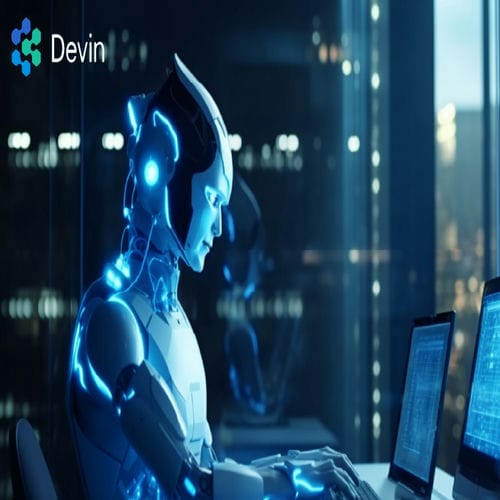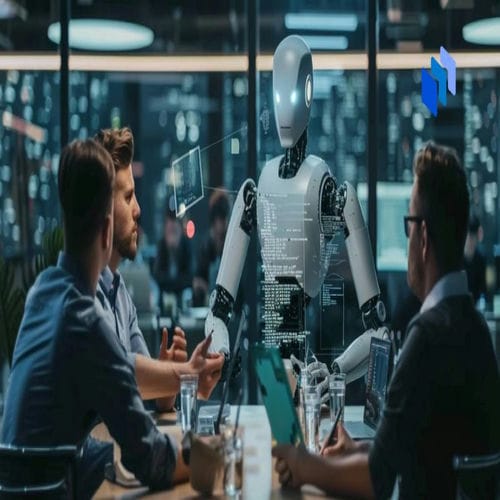Ever wondered how Devin can replace programmer or software engineer? Ever wondered if your next software engineer could be an AI? Devin Enter —the game-changer in software development. In a world where technology evolves faster than we can keep up, Devin offers a glimpse into the future of coding. But what exactly is Devin, and how could it potentially replace human programmers?
So, if you’re curious about the future of programming, join us on a journey into the world of Devin. Whether you’re a seasoned developer or simply interested in the convergence of AI and technology., get ready to be astounded by Devin’s contributions.
In this article, we’ll reveal the mysteries of Devin and explore its potential to revolutionise the way software is developed. From its remarkable speed and efficiency to its implications for the software engineering industry, there’s much to discover about this AI powerhouse. Let’s dive in and explore the possibilities together.
How Devin can Replace Programmer or Software Engineer?
You might have heard of Devin, the newest craze in the world of technology. But what exactly is Devin, and why is everyone talking about it? We’ll delve into the exciting realm of Devin and explore how it could potentially revolutionise the way software is developed.
1. Defining Devin: More Than Just Another Tech Term
Let’s clear up any confusion about what Devin actually is. Devin isn’t your typical software or programming language. Instead, it’s an advanced form of artificial intelligence (AI) specifically designed to assist in software development tasks.
Imagine having a virtual assistant who can understand complex code, spot errors, and even generate new code snippets—all in a fraction of the time it would take a human programmer.In essence, it is what Devin offers.
2. The Evolution of AI in Software Development
AI has come a long way in recent years, transforming various industries with its ability to automate tasks, analyse data, and make predictions. In the realm of software development,AI-powered technologies have already made an impact, simplifying operations and improving efficiency.
In this evolution Devin represents the next step, utilising the potential of artificial intelligence to tackle some of the most challenging aspects of software engineering. From writing code to testing and implementation, Devin promises to revolutionise every stage of the development life cycle.
3. Why You Should Care About Devin?
Now that you have a basic understanding of what Devin is, you might be wondering why it matters to you. Whether you’re a seasoned software engineer, a tech enthusiast, or simply curious about the future of technology, Devin has the potential to impact us all.
We’ll explore how Devin compares to human programmers, its potential implications for the software engineering industry, and the ethical considerations surrounding its adoption.

Understanding Devin: Your New AI Assistant
So, you’ve heard about Devin and its potential to shake up the software development scene. But what exactly is this AI wonder, and how does it work? Let’s break it down in simple terms.
1. Decoding Devin: What Is It Exactly?
Devin isn’t your typical AI chat-bot or virtual assistant like other Chatbot’s. Instead, it’s a specialised AI system specifically trained to understand and manipulate code. Think of it as a supercharged programmer’s best friend, capable of tackling complex tasks with lightning speed and precision.
2. What Role Does Devin Play in the AI World?
Artificial intelligence has been making waves in various industries, from healthcare to finance. In software development, AI has already proven its worth in areas like automated testing and code analysis. Devin takes this a step further by actively participating in the coding process itself and stand side by side with human.
3. Key Features of Devin: What Sets It Apart?
What makes Devin stand out from other AI tools in the market? For starters, its ability to understand and generate code is truly remarkable. But that’s not all—Devin is also quite good at spotting bugs, optimising algorithms, and even offering suggestions for improvement.
Devin vs. Programmers
Now that you have a knowledge on what Devin is and how it operates, let’s dive into the exciting showdown between Devin and human programmers. How does this artificial intelligence powerhouse compare to its human counterparts? Let’s find out.
1. Traditional vs. Trailblazing: The Software Development Process
Imagine a conventional software development team—a collection of knowledgeable programmers gathered around a keyboard, methodically creating lines of code. It’s a tried-and-true method that has served us well for decades. But now, Devin enters in this tradition—a game-changer in the world of coding.
2. Advantages of Using Devin Over Human Programmers
Speed and Efficiency: Devin can generate lines of code at an incredible rate, significantly reducing development time and speeding up time-to-market for software products.
Error Reduction and Debugging: Thanks to its advanced algorithms and machine learning capabilities, Devin is adept at spotting and fixing bugs, minimising the need for extensive manual debugging.
Flexibility and Adaptability: Whether you’re working on a small-scale project or a large-scale enterprise application, Devin can adapt to meet your needs, scaling its capabilities to match the complexity of the task at hand.
Cost-Effectiveness: Hiring a team of skilled programmers can be costly, especially for startups and small businesses. Devin offers a cost-effective alternative, eliminating the need for extensive manpower while delivering impressive results.

Devin’s Impact on the Software Engineering Industry: A Change in Perspective
Now that Devin stands against a human programmer and seen its impressive advantages, it’s time to explore the broader implications of its integration into the software engineering industry. How will Devin reshape the landscape of software development companies and the roles of programmers within them? Let’s take a closer look.
1. Changing Roles and Responsibilities of Programmers
With the rise of Devin in the programming field, the traditional roles and responsibilities of programmers are undergoing a significant transformation. Rather than spending hours writing a code line by line, programmers are now utilising Devin’s capabilities to focus on higher-level tasks such as problem-solving, project management, and innovation. This shift not only enhances productivity but also allows programmers to express their creativity and expertise in more strategic areas of development.
2. Consequences for Software Development Companies
For software development companies, involving Devin into their workflows presents a host of opportunities and challenges. On one hand, Devin offers the potential to streamline processes, reduce costs, and accelerate time-to-market for new products. On the other hand, companies must navigate the complexities of incorporating AI technologies into their existing infrastructure, ensuring seamless collaboration between Devin and human developers.
3. Opportunities for Innovation and Growth
Despite the challenges, the adoption of Devin opens up exciting possibilities for innovation and growth within the software engineering industry. Companies that embrace AI-driven technologies like Devin can gain a competitive edge, delivering higher-quality software solutions faster and more efficiently than ever before. Moreover, the emergence of Devin set up a wave of creativity and exploration, inspiring developers to push the boundaries of what’s possible in software development.
Ethical and Social Considerations: Navigating the Impact of Devin
As we delve deeper into the potential of Devin to transform the software development landscape, it’s crucial to pause and consider the ethical and social implications of this technological advancement in the field of programming or software engineering. From concerns about job displacement to ensuring fairness and accountability in AI-driven systems, there are various factors to weigh as we accept the era of Devin.
1. Job Displacement and Workforce Impact
One of the most severe issues surrounding the implementation of Devin into software development processes is the potential for job displacement within the workforce. As AI technologies continue to evolve and automate tasks traditionally performed by humans, there’s a valid fear that skilled programmers may find themselves sidelined or replaced by AI-driven systems like Devin. However, it’s essential to recognise that while Devin may change the nature of certain roles within the industry, it also creates new opportunities for upskilling, reskilling, and specialising in areas where human expertise is irreplaceable.
2. Ensuring Fairness and Accountability
Another critical consideration is the need to ensure fairness and accountability in the implementation of AI technologies like Devin. As powerful as these systems may be, they are not immune to biases or errors. It’s essential for developers and organisations to implement robust mechanisms for testing, validation, and supervision to reduce the possibility of unforeseen consequences or ethical violations.. Furthermore, transparency and openness regarding the use of AI in software development can create trust and confidence among users and stakeholders.
3. Regulatory Frameworks and Guidelines
To address these ethical and social concerns, policymakers and industry stakeholders must work together to establish clear regulatory frameworks and guidelines for the responsible use of AI technologies like Devin. By setting standards for transparency, accountability, and fairness, regulations can help ensure that AI-driven systems are developed and utilised in ways that prioritise the interests of the entire society..

Case Studies and Examples: Unlocking the Power of Devin in Software Development
Ready to see Devin in action? We’ll explore real-world case studies and examples that highlight the transformative impact of this AI powerhouse in the realm of software development. From streamlining workflows to driving innovation, these stories offer a glimpse into the future of AI-driven programming.
1. Real-world Applications of Devin in Software Development
Let’s start by examining how Devin is being used in practice to solve complex challenges and deliver measurable results. In one case study, a software development company implemented Devin’s capabilities to automate repetitive coding tasks, freeing up their team to focus on more strategic initiatives. By harnessing Devin’s speed and efficiency, they were able to accelerate their development cycles and bring new products to market faster than ever before.
2. Success Stories and Challenges Faced
But it’s not all smooth sailing—implementing Devin into existing workflows comes with its own set of challenges. In another case study, a company struggled to integrate Devin seamlessly into their development process, encountering compatibility issues and resistance from team members accustomed to traditional methods. However, with perseverance and strategic guidance, they were able to overcome these hurdles and unlock the full potential of Devin to drive innovation and growth.
3. Lessons Learned and Future Prospects
What can we learn from these case studies, and what do they tell us about the future of AI in software development? One thing is clear: Devin isn’t just a brief trend—it’s a game-changer with the potential to reshape the industry as we know it. As more companies embrace AI-driven technologies like Devin, we can expect to see a wave of innovation, efficiency gains, and new opportunities for collaboration between humans and machines.
Conclusion
As we come to the end of our journey into the world of Devin, it’s clear that we’re standing on the edge of a new era in software development. From its ability to streamline workflows and accelerate innovation to its potential to reshape the roles and responsibilities of programmers, Devin represents a seismic shift in how we approach coding.
Looking ahead, it’s essential for developers, organisations, and policymakers to embrace the opportunities presented by Devin while also addressing the ethical and social considerations that come with its adoption. By working together to establish clear guidelines, foster transparency, and prioritise fairness and accountability, we can ensure that AI technologies like Devin are harnessed for the greater good of society.
So, whether you’re a seasoned programmer, a curious technologist, or simply intrigued by the possibilities of AI, one thing is certain: the future of software engineering with Devin at the helm is brighter and more exciting than ever before.
Ready to explore the cutting-edge of software engineering? Dive into the future with Detrain. Visit devtrain.co for expert guidance, resources, and training programs to harness the power of Devin and stay ahead in the dynamic world of technology.
Don’t miss out on shaping the future of coding—join us at Detrain today!


